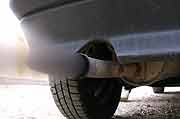Increased risk of organ rejection, death, but macrolides seem to reduce risk
WEDNESDAY, Sept. 30, 2015 (HealthDay News) — Living near busy roads with high levels of air pollution raises lung transplant patients’ risk of organ rejection and death, but use of macrolides may lower that risk, according to a study presented Tuesday at the annual meeting of the European Respiratory Society, held from Sept. 26 to 30 in Amsterdam.
Researchers examined data gathered from 5,707 lung transplant patients in 10 European countries between 1987 and 2013. The investigators found that patients who lived in areas where air pollution was above maximum levels recommended by the World Health Organization (WHO) were 10 percent more likely to die than those in areas with lower levels of pollution.
During the nearly six years of follow-up, 45.2 percent of the patients died and 47.1 percent developed chronic organ rejection. About 62 percent of patients took macrolides at some point. Chronic organ rejection occurred in 61.5 percent of those taking macrolides. Nearly 30 percent of patients taking macrolides died, compared with 54.5 percent of those who did not take macrolides.
“Short- and long-term exposure to air pollution has been linked to an increase in deaths from respiratory diseases, particularly among vulnerable populations,” study author David Ruttens, M.D., said in a European Lung Foundation news release. Ruttens is a specialist in respiratory medicine at the University of Leuven in Belgium. If air pollution were reduced to below the level recommended by the WHO, Ruttens said, “there would be a 9.9 percent reduction in deaths among lung transplant patients who were not taking macrolides, and 6.4 percent reduction among all patients, regardless of whether or not they were taking macrolides.”
Copyright © 2015 HealthDay. All rights reserved.








